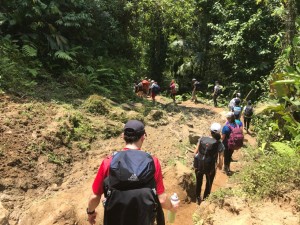 On March 5, 2018, I, along with 31 other students, left Bogotá in search of the Ciudad Perdida. We embarked on a journey that would eventually put our physical and psychological limitations to the test, and allow us to look at ourselves and others in a different light.
On March 5, 2018, I, along with 31 other students, left Bogotá in search of the Ciudad Perdida. We embarked on a journey that would eventually put our physical and psychological limitations to the test, and allow us to look at ourselves and others in a different light.
Coming from Montreal, or the West in general, we almost always take things for granted. It is part of who we are and the way in which our lives work. However, in Colombia, that is not a relatively universal concept. While hiking through the jungles and exploring the beauty that is nature, we often encountered other people – not tourists, but locals. Even our guides and staff were local Colombian workers, waking up before sunrise to make our journeys more comfortable. They would still have to hike the same treacherous paths that we did, but with the weight of cutlery, crockery, water, and several others on their backs.
The other type of locals that we observed and, in one evening, listened to, were the indigenous peoples. The native Kogui tribe has been a significant part of Colombia’s rich history for centuries. Often, they are the voice of all native tribes in the nation, unwavered by the events that have taken place, socially or politically. One of their most respected leaders discussed their culture and the context in which they live. He explained the idea of ‘Big Brothers’ and ‘Little Brothers’, the former being the indigenous and the latter being the immigrants. That idea elicited an internal reaction from all of us. In Canada, the deep-seated issues between the natives and the nationals have been the root cause of many problems that have arisen. We have all been taught about the hardships and unfair treatment that the native peoples have had to undergo. Listening to the leader of the tribe and his calmness was an incredible experience for us.
In terms of the actual hike, words cannot express our emotions and feelings. Hiking and struggling together brought everyone closer to one another, creating bonds that will definitely last a long time.
In a few campsites, we had the opportunity to go swimming in a river or creek. Personally, that was the best part about the hike. Most people don’t get the opportunity to go swimming in a native, traditional Colombian river in a winding jungle. I think that everybody took that to heart as we all jumped into the freezing waters eventually. It was an incredible experience to just look up and understand where we were. The beauty, the environment, the people – all pieces of the exhilarating puzzle that was this hike.
At night, along with playing several variations of cards, we would sit in small groups and reflect on different parts of the hike. We would mention the names of people who deserved credit on this hike. People would speak about those who were not feeling well during the hike, who were obviously struggling, but still moving. Others spoke about the people who motivated and supported. I believe everyone played a role in how we all finished the hike. If it wasn’t for the support of this person, or the humour of that person, it would have been difficult to find the courage and persistence to go on.
This hike, overall, was unbelievable. Sitting atop the Lost City and looking out changed the perspective for many. We all found something we never knew about ourselves and about each other. And that, in essence, paved the way for the rest of our lives. – Sahil Tyagi ’18
